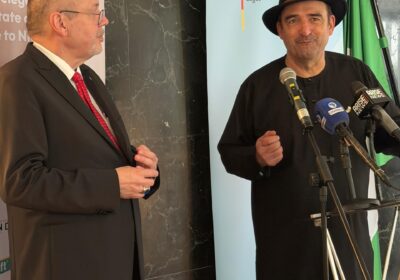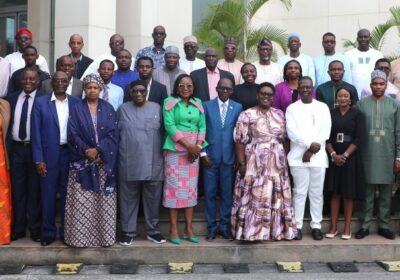NIMC Hosts Two-Day Roundtable with Online Editors, Highlights Progress, Reforms, and Media Partnership for Inclusive Digital Identity System.
By Raymond Enoch
In a bold move to strengthen public trust, deepen transparency, and promote inclusive access to digital identity in Nigeria, the National Identity Management Commission (NIMC), in collaboration with the Association of Corporate Online Editors (ACOE), held a two-day strategic roundtable workshop in Abuja.
The event, themed “Building Trust in Digital Identity: Strengthening Media Partnerships for a Secure and Inclusive Ecosystem,” brought together digital publishers, editors, and identity stakeholders to reflect on Nigeria’s progress in building a unified identity system and the critical role of the media in sustaining public awareness and accountability.
Representing the Director General/CEO of NIMC, Engr. (Dr.) Abisoye Coker-Odusote was Dr. Alvan Ikoku, who delivered her keynote address. In her remarks, the DG commended the vital role the media plays in shaping public discourse, promoting government transparency, and serving as a bridge between policy and the people.
“You have reported our highs and lows, challenged us to do better, and supported us with your platforms. Today, I ask that we deepen this collaboration to ensure every Nigerian understands the value of identity, their rights, and the impact of digital inclusion,” she noted.
Digital Identity Transformation: From Fragmentation to Inclusion
Engr. Coker-Odusote highlighted the transformation of Nigeria’s identity ecosystem from a fragmented and exclusionary system to a people-centred, secure, and unified platform. She announced that enrolment in the National Identity Number (NIN) system has grown from 72.7 million in 2022 to over 122 million by July 2025 a 49% increase in just over three years.
This increase has enabled millions of Nigerians to access services in education, health, agriculture, and financial sectors, further empowering the country’s underserved populations.
The Commission’s investment in digital infrastructure, automation, and backend upgrades has improved service delivery, with special tools such as the NINAuth mobile app, Self-Service Enrolment app, and Contactless Biometric Solutions already deployed.
Tangible Reforms and Strategic Partnerships
Key institutional reforms were outlined during the event. These include:
Curtailment of extortion and unofficial fees by 40%
A transparent, standardised fee structure for modifications and authentication
Payment of all backlog debts owed to enrolment partners
Strategic collaborations with critical MDAs such as NHIS, FIRS, JAMB, INEC, CBN, NCC, NCoS, FRSC, and PENCOM were showcased. These partnerships have streamlined identity verification processes across corrections, education, health, and pension services. NIN-enabled systems now support access to student loans (via NELFUND), agricultural subsidies, enterprise funding (SMEDAN, BOI), and workers’ compensation (NSITF), among others.
The upcoming General Multipurpose Card (GMPC), expected in October 2025, will provide citizens with a secure, multifunctional ID that allows seamless access to government services, banking, health insurance, and digital platforms.
Promoting Inclusion through ID4D Support
The roundtable also featured remarks by Mrs. Tito Ejanavi, Project Coordinator of the Nigeria Digital Identification for Development (ID4D) project funded by the World Bank, French Development Agency, and the European Investment Bank. She reaffirmed ID4D’s support for inclusive enrolment efforts, especially among vulnerable groups such as women, persons with disabilities, children, and rural dwellers.
Through the ID4D project, over 7,167 Front-End Enrolment Agents have been trained and deployed nationwide. In addition, infrastructure upgrades, biometric identification improvements, and strategic reforms have enhanced national enrolment coverage, equity, and security.
“We are not only investing in systems but in people. Through workshops, stakeholder dialogues, and grievance redress training, our teams are now better positioned to serve Nigerians more effectively,” Ejanavi said.
She commended the DG for her visionary leadership and reaffirmed the project’s commitment to sustaining media engagement.
ACOE Pledges Continued Media Support
In his address, Mr. Shola Akingboye, President of the Association of Corporate Online Editors (ACOE), praised NIMC’s efforts and reiterated the media’s commitment to transparency and public education.
“The right of Nigerians to know is essential for governance. We assure NIMC of our unwavering support as watchdogs and partners in this national assignment,” he stated.
Mr. Akingboye acknowledged previous roundtable engagements, including one in November 2024, and emphasised the importance of sustained dialogue between NIMC and the online media space to dispel misinformation and educate citizens about the value of identity management.
Technical Sessions and Capacity Building
The event featured several technical presentations from senior NIMC officials:
Dr. Alvan Ikoku delivered a lecture on Strategic Alliances with MDAs and the Implications for Inclusion
Mr. Elias Okafor, Director of IEU, presented on the Essence and Challenges of National Ecosystem Enrolment
Mrs. Uche Chigbo, South-East Zonal Director, discussed NIMC’s Operational Reforms and Innovations to Strengthen Systems and Personnel
A Q&A session followed, including media interviews with Mrs. Chigbo, offering clarity on emerging identity system reforms.
The DG concluded by charging the media to become co-builders of Nigeria’s digital identity revolution through accurate reporting, advocacy campaigns, and grassroots awareness creation. She emphasised the need for public education to bridge digital literacy gaps and ensure that no Nigerian is left behind.
“Together, we can build a trusted, robust identity ecosystem where every citizen can confidently say: ‘I am recognised. I am included. I am identified,’” she declared.
With over 172 million SIM-NIN linkages, 3 million farmers and 800,000 students already benefiting from identity-linked services, NIMC’s digital identity drive continues to redefine access, eq









